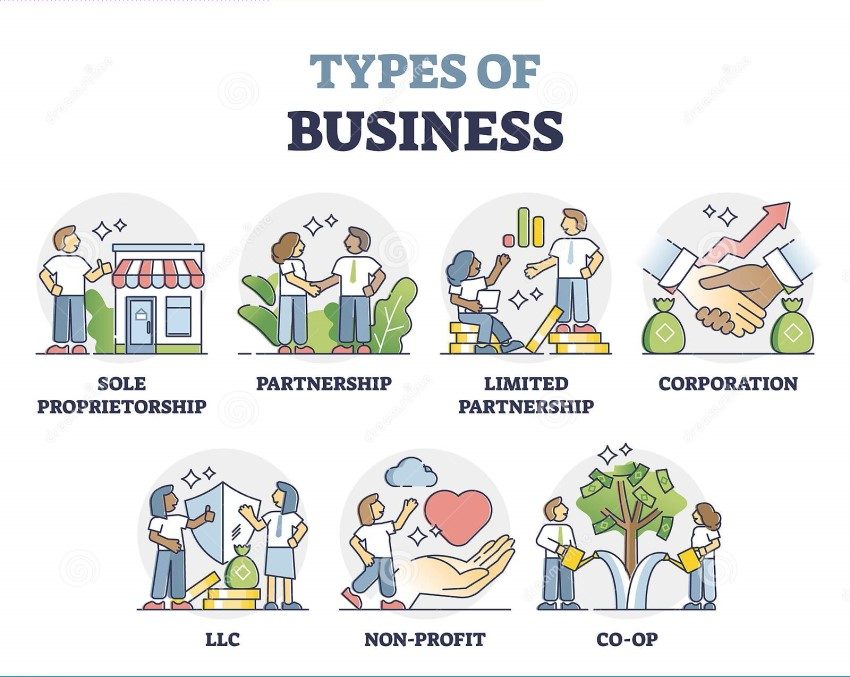Businesses are the backbone of an economy. They offer goods and services that other people and businesses can purchase. Businesses come in diverse shapes and sizes and work in a wide variety of industries. So what is business? What are the business-related factors that you need to know when starting a business? Everything will be explained in the post today.
What is business?
Business is roughly understood as the activity of investing, buying, selling, producing and providing services for business entities to conduct independently for the purpose of generating profits. Business activities are usually through business institutions such as corporations, and companies or can also be self-made activities of individuals such as trading, and small-scale production of households. Businesses range in size and scope from sole proprietorships to large international corporations.

Business Types
There are numerous sorts of enterprises to choose from when starting a corporation, each with its own legal structure and standards. Generally, there are four main types of businesses: Sole Proprietorship, Partnership, Limited Liability Company (LLC), and Corporation. Before starting a business, entrepreneurs should carefully consider what type of business structure is best for their business.
Sole Proprietorship
A solo proprietorship is run and owned by one individual. There is no legal separation between the business and the owner, which means that the taxes and legal obligations of the business are the responsibility of the owners. While this is the simplest type of business, it also offers the least amount of financial and legal protection for the owner. Entrepreneurs can choose this option if they want to keep full control of the company.
Partnership
A partnership is a working arrangement between two or more parties engaged in business. Each partner invests money and resources in the company, and they split the company’s gains and losses. This type of business comes in two forms: general partnership and limited partnership.
- General Partnership: The partners own and operate the business and are legally responsible.
- Limited Partnerships: Limited partners are just investors, with only as much liability as their financial stake in the business. However, as limited partners, they do not participate in management decisions and do not have any direct control over the company.
Limited Liability Company (LLC)
A limited liability company (LLC) is one of the most flexible types of business. This is a relatively new business structure and first appeared in Wyoming in 1977 and in other states in the 1990s. LLCs combine elements of corporations and partnerships. They continue to enjoy the tax advantages of a sole proprietorship and the corporations’ limited liabilities. One of the benefits of an LLC is that there aren’t any restrictions on the number of shareholders the business can have.
In addition, any owner or member can have a role to participate fully in the operation of the business. The downside to this type of business is that since the limited liability company is a relatively new business structure, the tax treatment can vary by state.

Corporation
A corporation is a distinct legal body that shareholders establish. Establishing a business protects the owner from being personally liable for the company’s debts or legal disputes. Setting up a company is more complicated than the other three types of businesses. The articles of the company must be drafted, which include information such as the number of shares to be issued, the name and location, and the purpose of the business.
In sole proprietorships and partnerships, if one of the owners dies or declares bankruptcy, the company is dissolved. In contrast, corporations exist as legally separate entities. Therefore, they are protected from this condition and will continue to exist even after the death of the business owner. There are 3 main types of companies:
- C Corporation
This is the most common form of consolidation. The company is taxed as a business entity and the owners who receive the profits are then taxed individually. - S Corporation
Similar to a C corporation but can only include up to 100 shareholders. S corporations are pass-through entities such as partnerships, so profits are not taxed twice. - B Corporation
AB Corporation, also known as a benefit corporation, is a for-profit corporation driven by mission and profit. They fall under the same tax bracket as C corporations but still have a greater focus on purpose, accountability, and transparency. To qualify as a B company, a company must receive a certification recognizing its dedication to social and environmental responsibility and transparency. - Non-profit corporation
Non-profit corporations focus on philanthropic work. Because their work benefits the public, they will be exempt from taxes. All forms of incoming cash flow must be used to fund the organization’s operations or future plans.
See details: 5 Main Types of Business- What is The Difference?
Business sector

Agriculture and mining industry
This is a business related to the production of agricultural raw materials and minerals. The main raw materials are aquaculture, animals, logging, minerals, or growing and trading agricultural crops.
Financial services industry
Financial services include banks, financial companies, insurance companies, etc. profit through investment and capital management. Currently, the market economy is developing more and more, and a series of financial and banking services that are beneficial to both users and providers are constantly being launched. This shows the open future of this field.
Information industry
This is an industry where business companies will profit from the resale of intellectual property rights. An intellectual property right is a right that the owner of such products can, upon registration, resell or transfer, but for a limited time, the registered products to ensure that the intellectual property is not pirated arbitrarily way.
Service industry
A service business is one of the three main business types that are developing very quickly today. This is a business that does not create tangible goods but provides intangible goods and services, profiting by valuing labor and experience. For example Hotel business, restaurant business, travel business, legal consulting…
Transportation business
Transport businesses will profit from the cost of transporting goods from one place to another. The transportation business can operate in many forms and through many different types of vehicles.
Manufacturing
Producing goods from raw materials or components, then selling them for a profit. These are businesses that are directly responsible for providing goods in the consumer market. Especially essential items and products for the daily needs of consumers. Commodity production is applied to technology, science and technology to produce a diverse line of products including software, machines, and engines, and then sell them to bring in revenue.
See details: What Does Business Field Meaning?
Business Plan
A business plan is a required document for new businesses or companies in a reorganization where the business plans a major change in operations. This plan can explain the schedule for how the Company will use the bank loans, plus management goals and profit targets for the next three or five years. This report is usually accompanied by a projected statement of expected income and expenses for the same period. This plan is usually set up by business owners, executives, marketing directors or people in related positions. The possibility of the plan being implemented is higher the more specific and detailed the plan’s content is.

The roles of business plan
To be able to survive and develop, to find a business direction for your business, you must have a specific business plan. This plan helps businesses grasp the actual situation and give future directions. It helps businesses identify goals, strategies, markets, customers, competitors, and internal resources of the business, giving business directions and implementation methods. Planning is at the heart of business planning, planning helps to have a better vision for the business in the future. Writing a business plan is an important step in laying the groundwork for achieving realistic business goals.
Principles of building a business plan
- Need to take into account business goals and results
- Assess the situation, check the current situation of the company, understand the company’s culture and follow fiercely to complete the schedule early.
- Analyze the results then adjust for the next time for a better ability to capture reality.
- When building a plan, the sentence should be short, without using strange words. Content needs to be carefully reviewed and edited.
- Avoid overestimated profit projections, or incomplete accompanying financial plans, or plans in which goals are not specific.
- Focusing on the project summary is one of the most important parts of a business plan.
How to build a business plan?
- Business idea: A good and good business idea will help us build the right business plan. This idea includes: opportunities, feasibility, market needs and differentiation.
- Business goals: must define the business goal, see what is achieved after implementing this business campaign and outline a time to accomplish it.
- Capturing the market: understanding the weaknesses and strengths of competitors, so we can be more proactive in situations. Identify your capabilities in business strategy as well as recognize strengths and risks.
- Building a Marketing Plan: A marketing strategy will bring in a number of customers and bring new products to everyone around.
- Human resource management: Human resource is one of the cells of the company, or enterprise…the human resource management mechanism includes their working skills. It is also necessary to closely strengthen the management and improve staff training and development.
See details: What is Business Plan? Some Popular Business Plans Nowadays
Business Ideas
A business idea is a concept that can be used to achieve financial gain often centered on a product or service that can be provided with money. An idea is the first milestone in building a successful business. The characteristics of a promising business idea are: Innovative – Unique – Profitable – Understandable.

Advisor
If you are knowledgeable and passionate about a particular topic (like business, social media, marketing, HR, leadership, or communications), consulting can be a lucrative option. You can set up a consulting business on your own, then grow your business and hire other consultants over time.
Online teaching
The demand for online education for busy people is increasing day by day. Since this is an online venture, you can choose any topic you know and teach a course regardless of location. If you don’t have advanced knowledge on any particular topic, consider teaching English as a foreign language online to foreign students.
Transliteration Service
If you have good hearing and can type quickly, a transcription service will allow you to work from home with a flexible schedule. You can accept as little or as much copy work as you like depending on how much free time you have. Best of all, there’s very little to get started with. A computer, the appropriate software, and a secure messaging provider are all you need.
Cleaning service
You can easily start a cleaning business if you enjoy it. With a few employees, a wide range of cleaning supplies, and transportation, you can provide cleaning services to homeowners, condominiums, and businesses.
Write ads
If you can write with a little knowledge of marketing and marketing, you can become a copywriter or freelance content writer. Whether you write blogs, web content or press releases, a lot of companies will pay for your services. Increase your value by using SEO knowledge to help clients build strategies around the specific keywords their target audience has used in their online searches. This can be seen as a great business. You can work anywhere as long as you have an Internet connection. If you establish a large enough network and get referrals from satisfied clients, you can even turn freelance writing into your full-time job.

Rideshare driving
If starting your own business seems difficult or too risky, you can always use your car to become a carpool driver. Ride-hailing apps like Uber and Lyft allow people to start side jobs that pay well and require little more than a willingness to drive people to their destinations and an occasional friendly chat.
Real estate
For many people, navigating the housing market is overwhelming. You can assist customers in finding their ideal house at a price that suits their budget by working as a real estate agent. In many states, being a real estate agent just requires passing an exam and a few months of formal education. To pursue this career, you must possess strong social skills in addition to certification.
Take care of the pet
About 70% of homes in the US have pets. Your small pet care business can give these families peace of mind when they are gone for extended periods of time. You will keep an eye on the dogs, cats, and other pets that belong to your clients while they are away. The work also includes making sure they are fed, given water, played with, spent time with, and (with the dog) taken for walks as needed. You must often update your clients on the state of their pets if you want to keep them satisfied.
See details: How to Sell on Depop – A Beginner’s Guide
Business Development
Business development is essential and considered an important goal of any business. A low growth rate is always seen as a threat to business survival. So what are the top 4 strategies for effective business development?
Delegation of duties
In the age of information technology, managing remote employees has never been easier. This doesn’t mean your entire staff needs to be remote, but you can completely expand your employee profile by relying on skills rather than location. You can’t manage a single business and directly solve all the problems that arise, so you need to consider empowering individuals and organizations to help with other issues. together.
This not only helps you to optimize business efficiency but also benefits your business. Therefore, hire people who are capable of doing the work you assign, they will certainly bring more results than you do yourself. Spend your time and energy focusing on the more important things that directly impact and drive sales for your business.

Use social media properly
It is an undeniable fact these days that an online presence is extremely important to a business’s branding. One of the simplest and fastest ways is to use the right social channels. You need to come up with a separate goal idea for each social media channel to be able to take advantage of its power.
Grow customer base
Each business line is aimed at different customers and these customers either decrease or increase day by day, so it requires you to know the needs of users to make timely improvements. time, improve service quality. Besides, you also need to come up with new solutions to meet new needs. Customer feedback and comments will be extremely helpful for your business. The best way to understand customers is to interact, interact and listen to them as much as possible.
You can launch trial events, and new product launches, thereby encouraging customers to rate, comment and give opinions, not only making your products and services better but also helping you engage with customers. You need to integrate more consulting tools, and 24/7 online customer support to providing timely answers to your customers’ questions, this is extremely necessary because no customer stays. with you for too long if you do not receive timely “care”.

Manage investments
All successful businesses have to reinvest in the growth of the business, in the process, it is important to consider whether the money you have spent is reasonable, consider before moving. direct investment spending in another area. Priority should be given to investments that improve the products and services your business is providing. Other investments, such as some types of advertising, can be reconsidered, should only maintain the right channels, really effective. Besides, it is necessary to clearly define the potential market that your business is targeting, but it is necessary to study and invest carefully.
How to Register a Business?
The business registration process will vary depending on the type of operation, the size of the operation, and the state you live in. Below, we’ll explain the basics of how to register your business.
Choose business structure
The first step is to decide on the business structure. The business structure (also known as a business entity) that you choose affects how you pay your taxes, your day-to-day operations, and how much of a risk your personal wealth is if your business fails. Because the business structure you choose affects so much, you must do this first.
There are 4 most common types of business structures, including: Sole proprietorship, Partnership, Limited liability corporation (LLC), and Corporation. The characteristics of each type, have been explained very clearly in the previous section. The business structure you choose correlates with the type of documents you must file with the state clerk’s office in which the business operates in order to register your business.
Find a location
Once you choose the business structure that works best for you, you need to choose a location. That doesn’t mean your business has to have a physical location. As far as your business registration goes, it means the address you use to pay taxes, receive important documents from government agencies, or your business bank account.

Register a business name
To register any type of business, you must also choose a business name. Most states, including Texas, do not allow two businesses operating in the state with the same name. Therefore, you should choose a few fallback names in case your first choice is already taken. If you are registering a corporation, the business name must bear one of the following symbols: Incorporated, Corporation, Company, Inc., Corp. or Co.
Register with the IRS
Next, you need to register your business with the Internal Revenue Service (IRS) to receive an Employer Identification Number (EIN). Your EIN is like the Social Security number for your business and is needed to pay taxes. This is the number you use to file all your business tax returns and can be obtained by completing IRS Form SS-4.
Register with state and local agencies
Once all federal registrations are complete, you may need to register your business with one or more agencies in your state or local government, such as the revenue office. You can obtain an application regarding your business structure from the office of the Secretary of State of the state in which you register your business. Depending on the business structure, you may have to provide additional documentation with the application.
Obtain Business Licenses
Some companies require one or more licenses in order to function. The types of business licenses you need depend on the type of business you’re running and the city, county, and state. While some states require you to have a business license, others, such as Texas, do not require a state license for businesses.
Maintain a Business License
After registering your business, it is important to comply with all filing requirements. Even if you plan to close your business, you will often need to file the necessary forms to avoid penalties. A new license can also be necessary if you decide to grow your company and add new goods or services. There are several requirements set by each state or municipal government.
Business Insurance
Business insurance protects a business from losses due to problems that may occur in the course of doing business. Based on prospective risks, which might change depending on the environment in which a firm operates, businesses evaluate their insurance needs. There are many different kinds of company insurance, such as coverage for employee-related risks and property damage.
Professional Liability Insurance
Professional liability insurance has a duty to protect against malpractice claims due to errors or non-performance. There isn’t a single professional liability policy.
Property Insurance
Equipment, signage, merchandise, and furnishings are all covered by property insurance in the case of a fire, storm, or theft. However, it excludes catastrophic occurrences like floods and earthquakes. You will require a different policy if your region is susceptible to these issues. In the event of a claim, the policy’s property insurance will pay the policyholder the actual cost of the loss or the replacement cost of repairing the issue.
Product Liability Insurance
Product liability insurance is crucial if your company produces goods for sale. Any company can be sued for harm brought on by its products. In these situations, product liability insurance defends the company.
Vehicle Insurance
Any vehicle used for business reasons must be fully insured. If employees use their personal automobiles for work, their personal insurance will cover them in the event of an accident. A significant exception is when someone, such as delivery employees, provides goods or services in exchange for payment.
Business Interruption Insurance
A business interruption (or continuation) policy is a special type of coverage that applies to companies that require a physical location to do business, such as a retail store or manufacturing facility. Business interruption insurance indemnifies businesses for lost income during events that cause disruption to the normal course of business.
Frequently Asked Questions
What business should I choose?
Often, the best business for you is the one you are most skilled at and most interested in. As you consider your options, it’s a good idea to consult with local experts and entrepreneurs about opportunities in your area. Matching your background with local market characteristics will increase your chances of success.
How much cash will I need to get going?
After you have completed the necessary formalities to start your business, you should also have enough money on hand to cover your operating expenses (fixed and variable costs) for at least one year. These costs include your salary, as the owner, and money to pay off your loans. Inadequate start-up money is one of the main reasons why businesses fail. To assess your cash flow requirements, you should collaborate closely with your accountant.

How can I come up with a great name for my business?
First, try to think of different names that you love, that might be closely related to you. Then do a Google search to see what’s been done and that will eliminate 95 percent of your selections. Note choosing names that are easy to spell, is a little interesting. Don’t choose a meaningless name that will make people wonder what you do.
In conclusion, through this article, you already know what a business is. Factors to determine when doing business as well as how to register. This post is a bit long, so please read it all. We guarantee that there will be a lot of useful information for you.
Read more:


